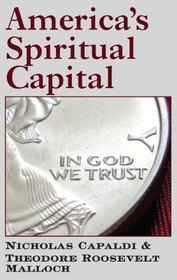Search -
America's Spiritual Capital
America's Spiritual Capital
Author:
This book tells a story, a story about America?s spiritual capital. Spiritual capital is the fund of beliefs, examples, and commitments that are transmitted from generation to generation through a religious tradition, and which attach people to the transcendent source of fulfillment and happiness. America has created the greatest civilization th... more »
Author:
This book tells a story, a story about America?s spiritual capital. Spiritual capital is the fund of beliefs, examples, and commitments that are transmitted from generation to generation through a religious tradition, and which attach people to the transcendent source of fulfillment and happiness. America has created the greatest civilization th... more »
ISBN-13: 9781587310379
ISBN-10: 1587310376
Publication Date: 6/30/2012
Pages: 176
Edition: 1
Rating: ?
ISBN-10: 1587310376
Publication Date: 6/30/2012
Pages: 176
Edition: 1
Rating: ?
0 stars, based on 0 rating
Publisher: St. Augustines Press
Book Type: Paperback
Members Wishing: 0
Reviews: Amazon | Write a Review
Book Type: Paperback
Members Wishing: 0
Reviews: Amazon | Write a Review
Genres:
- Business & Money >> Economics
- Business & Money >> Popular Economics
- Categories >> Kindle eBooks >> Religion & Spirituality >> Religion, Politics & State
- Religion & Spirituality >> Religious Studies >> Church & State
- Religion & Spirituality >> Religious Studies >> Sociology
- Nonfiction >> Social Sciences




